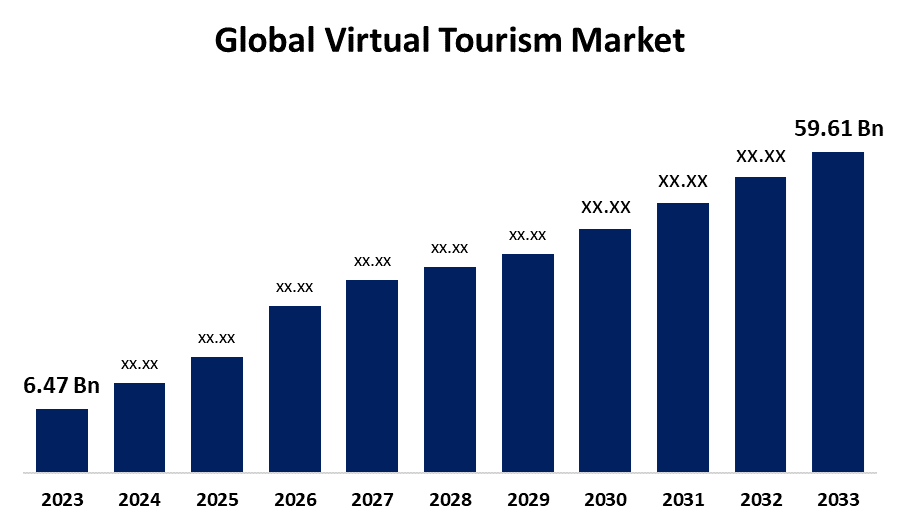Global Virtual Tourism Market Size, Share, and COVID-19 Impact Analysis, By Type (360 Virtual Tours, 3D Virtual Tours, and Virtual Reality Tours), By Application (Tourism, Real Estate, Art Galleries & Museums, and Others) and By Region (North America, Europe, Asia-Pacific, Latin America, Middle East, and Africa), Analysis and Forecast 2023 - 2033.
Industry: Consumer GoodsGlobal Virtual Tourism Market Insights Forecasts to 2033
- The Global Virtual Tourism Market Size was Valued at USD 6.47 Billion in 2023
- The Market Size is Growing at a CAGR of 24.87% from 2023 to 2033
- The Worldwide Virtual Tourism Market Size is Expected to Reach USD 59.61 Billion by 2033
- Asia Pacific is Expected to Grow the fastest during the forecast period.

Get more details on this report -
The Global Virtual Tourism Market Size is Anticipated to Exceed USD 59.61 Billion by 2033, Growing at a CAGR of 24.87% from 2023 to 2033.
Market Overview
A digital recreation of a real place, virtual tourism usually consists of a collection of interconnected photos or movies that produce a smooth, realistic experience. Virtual tours are widely utilized in real estate, tourism, education, entertainment, and other areas. They provide a practical and interesting means of showcasing properties, locations, or experiences. With the convergence of technological breakthroughs and commercial demand, virtual tourism, previously thought to be futuristic, is quickly becoming a reality. The growing popularity of smartphones and other technical advancements in the field of tours, virtual tours are becoming increasingly important and are driving the virtual tourism market. Technological developments in virtual reality and augmented reality, coupled with an increase in the desire for immersive experiences and the growing popularity of the travel and tourism industry, are the main factors driving the virtual tourism market. The rising use of augmented reality and virtual reality technologies, which improve the interaction and realism of virtual tours, is the main factor driving the growth of the virtual tourism market.
Report Coverage
This research report categorizes the virtual tourism market based on various segments and regions forecasts revenue growth and analyzes trends in each submarket. The report analyses the key growth drivers, opportunities, and challenges influencing the virtual tourism market. Recent market developments and competitive strategies such as expansion, type launch, development, partnership, merger, and acquisition have been included to draw the competitive landscape in the market. The report strategically identifies and profiles the key market players and analyses their core competencies in each sub-segment of the virtual tourism market.
Global Virtual Tourism Market Report Coverage
| Report Coverage | Details |
|---|---|
| Base Year: | 2023 |
| Market Size in 2023: | USD 6.47 Billion |
| Forecast Period: | 2023-2033 |
| Forecast Period CAGR 2023-2033 : | 24.87% |
| 2033 Value Projection: | USD 59.61 Billion |
| Historical Data for: | 2019-2022 |
| No. of Pages: | 230 |
| Tables, Charts & Figures: | 116 |
| Segments covered: | By Type, By Application, By Region, COVID-19 Empact, Challenges, Future, Growth, & Analysis |
| Companies covered:: | Greater Anglia, Marriott International, First Airlines, Visit Wales, Google Earth VR, Dubai 360, Bristol From Home, Ascape VR, Xplorit, Matterport, Expedia, Comp11, TourVista, Blue Raven Studios, and and Other Key Vendors. |
| Pitfalls & Challenges: | COVID-19 Empact, Challenges, Future, Growth, & Analysis |
Get more details on this report -
Driving Factors
The potential uses of virtual tours in healthcare, advanced headsets and display units, 5G and other advanced networks, technological advancements, reduced product costs, increased gaming and entertainment options, and virtual tourism are all anticipated to drive the growth of the virtual tourism market. Several initiatives are being taken by the local and federal governments to support virtual tourism; the development of infrastructure and promotional strategies will take precedence because virtual tourism has significant technological problems that must be focused on driving the growth in the virtual tourism market.
Restraining Factors
The market growth for virtual tours is severely restricted by the lack of accessibility to augmented reality (AR) and virtual reality (VR) equipment. However, the intense experiences that VR headsets and AR gadgets provide, their restricted availability, and relatively high cost prevent their adoption.
Market Segmentation
The virtual tourism market share is classified into type and application.
- The 3D virtual tours segment is estimated to hold the largest market revenue share through the projected period.
Based on the type, the virtual tourism market is classified into 360 virtual tours, 3D virtual tours, and virtual reality tours. Among these, the 3D virtual tours segment is estimated to hold the largest market revenue share through the projected period. Traveling using 3D virtual tours is immersive and interactive, much like traveling in real life. With these tours, users can explore locations from the comfort of their homes due to the interactive features and detailed 3D views.
- The tourism segment is anticipated to hold the largest market share through the forecast period.
Based on the application, the virtual tourism market is divided into tourism, real estate, art galleries & museums, and others. Among these, the tourism segment is anticipated to hold the largest market share through the forecast period. Enhancing engagement and interest, tourism offers immersive and interactive experiences that are similar to real-world travel. They also work as effective marketing tools, enabling locations to highlight their assets and draw in new tourists.
Regional Segment Analysis of the Virtual Tourism Market
- North America (U.S., Canada, Mexico)
- Europe (Germany, France, U.K., Italy, Spain, Rest of Europe)
- Asia-Pacific (China, Japan, India, Rest of APAC)
- South America (Brazil and the Rest of South America)
- The Middle East and Africa (UAE, South Africa, Rest of MEA)
North America is anticipated to hold the largest share of the virtual tourism market over the predicted timeframe.

Get more details on this report -
North America is anticipated to hold the largest share of the virtual tourism market over the predicted timeframe. North America has a large market due to its sophisticated technology infrastructure, extensive internet availability, and high level of consumer interest in digital experiences. Virtual exploration is a great way to explore the region's rich cultural, historical, and natural features, which draw in visitors from all over the world.
Asia Pacific is expected to grow at the fastest CAGR growth of the virtual tourism market during the forecast period. With the increase in immersive digital experiences in Asia Pacific and the quickening pace of technology advancements and internet access, this market is expected to increase. Virtual tours can benefit greatly from the rich content provided by the region's historical sites, natural features, and unique cultural heritage.
Europe is anticipated to hold a significant share of the virtual tourism market over the predicted timeframe. Virtual tools are being used by European organizations and tourist places more often to reach audiences and improve visitor interaction. Moreover, the need for virtual alternatives that let tourists explore without harming the environment is being driven by the increased interest in sustainable travel options.
Competitive Analysis:
The report offers the appropriate analysis of the key organizations/companies involved within the virtual tourism market along with a comparative evaluation primarily based on their type of offering, business overviews, geographic presence, enterprise strategies, segment market share, and SWOT analysis. The report also provides an elaborative analysis focusing on the current news and developments of the companies, which includes type development, innovations, joint ventures, partnerships, mergers & acquisitions, strategic alliances, and others. This allows for the evaluation of the overall competition within the market.
List of Key Companies
- Greater Anglia
- Marriott International
- First Airlines
- Visit Wales
- Google Earth VR
- Dubai 360
- Bristol From Home
- Ascape VR
- Xplorit
- Matterport
- Expedia
- Comp11
- TourVista
- Blue Raven Studios
- Others
Key Target Audience
- Market Players
- Investors
- End-users
- Government Authorities
- Consulting And Research Firm
- Venture capitalists
- Value-Added Resellers (VARs)
Recent Developments
- In August 2024, the organization's official website, the BA Cultural Outreach Sector launched virtual tours for multiple institutions, in partnership with the Heritage International Institute and the Italian Embassy in Cairo. Public access to the Museum of Manuscripts, the Museum of Antiquities, the Sadat Museum, and the World of Shadi Abdel Salam Exhibition is made possible by these immersive, high-resolution experiences.
- In July 2024, Greater Anglia launched a virtual tour program for the Witham rail station in the United Kingdom in an attempt to improve accessibility. Using the web application, travelers can familiarize themselves with station features such as bathrooms, ticket machines, platforms, and transportation connections before their visit. With a similar focus on identifying potential accessibility obstacles and lowering travel anxiety, eighteen other stations also provided 360-degree tours.
Market Segment
This study forecasts revenue at global, regional, and country levels from 2023 to 2033. Spherical Insights has segmented the virtual tourism market based on the below-mentioned segments:
Global Virtual Tourism Market, By Type
- 360 Virtual Tours
- 3D Virtual Tours
- Virtual Reality (VR) Tours
Global Virtual Tourism Market, By Application
- Tourism
- Real Estate
- Art Galleries and Museums
- Others
Global Virtual Tourism Market, By Regional Analysis
- North America
- US
- Canada
- Mexico
- Europe
- Germany
- UK
- France
- Italy
- Spain
- Russia
- Rest of Europe
- Asia Pacific
- China
- Japan
- India
- South Korea
- Australia
- Rest of Asia Pacific
- South America
- Brazil
- Argentina
- Rest of South America
- Middle East & Africa
- UAE
- Saudi Arabia
- Qatar
- South Africa
- Rest of the Middle East & Africa
Frequently Asked Questions (FAQ)
-
What is the CAGR of the virtual tourism market over the forecast period?The virtual tourism market is projected to expand at a CAGR of 24.87% during the forecast period.
-
What is the market size of the virtual tourism market?The Global Virtual Tourism Market Size is Expected to Grow from USD 6.47 Billion in 2023 to USD 59.61 Billion by 2033, at a CAGR of 24.87% during the forecast period 2023-2033.
-
Which region holds the largest share of the virtual tourism market?North America is anticipated to hold the largest share of the virtual tourism market over the predicted timeframe
Need help to buy this report?